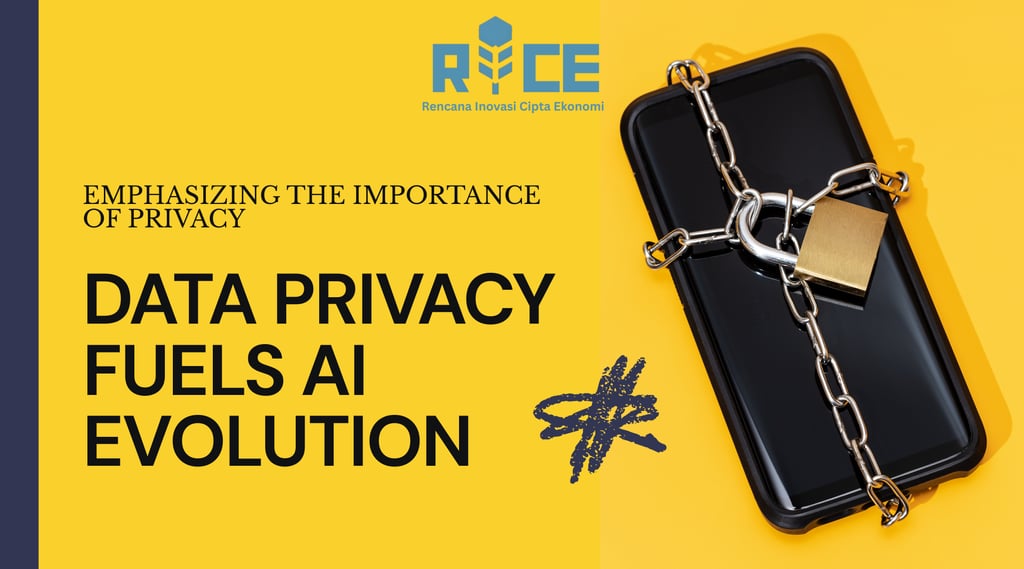Data Privacy Isn't Killing AI Innovation; It's Forcing Its Evolution
Learn how privacy-preserving AI technologies build trust, reduce risks, and open new opportunities for responsible, cutting-edge innovation.
AI INSIGHT
Rice AI (Ratna)
9/16/20257 min baca


The discourse around Artificial Intelligence (AI) frequently brings to the fore a perceived conflict: the seemingly insatiable data demands of AI models clashing with increasingly stringent global data privacy regulations. For many, the rise of frameworks like the General Data Protection Regulation (GDPR), the California Consumer Privacy Act (CCPA), and countless others represents a looming threat, a regulatory chokehold stifling the very innovation that promises to redefine our future. Industry experts and business leaders alike often express apprehension that these privacy mandates will inevitably slow down AI development, limit its capabilities, and increase operational costs to an unbearable degree. However, this perspective fundamentally misunderstands the dynamic at play. Far from being a hindrance, data privacy is not just a regulatory hurdle; it is a powerful catalyst, compelling AI innovation to evolve, mature, and ultimately become more robust, ethical, and trustworthy.
The narrative that privacy is an impediment overlooks a crucial truth: legitimate concerns about data misuse, algorithmic bias, and surveillance capitalism necessitate a re-evaluation of how AI interacts with personal information. As AI systems become more pervasive, their potential impact on individuals and society escalates. Ignoring these ethical and societal considerations would not lead to sustainable AI growth but rather to a breakdown of public trust, leading to greater resistance and, eventually, a true stifling of innovation. Instead, privacy regulations are acting as a vital evolutionary pressure, pushing the AI industry beyond its initial data-hungry phase towards more sophisticated, secure, and socially responsible paradigms. This pivotal shift is not merely about compliance; it's about building a future where AI's transformative power is harmonized with fundamental human rights.
The Perceived Conflict and the Inevitable Reality
The initial alarm is understandable. AI models, particularly those leveraging deep learning, have historically thrived on vast quantities of data. More data often equates to better performance, higher accuracy, and broader applicability. When regulations impose restrictions on data collection, storage, processing, and transfer, it naturally raises questions about the viability of traditional AI development methodologies. Companies fear reduced access to training datasets, increased compliance costs, the complexity of managing data consent, and the significant penalties associated with breaches or non-compliance. These concerns are real, and navigating this new landscape requires substantial investment in legal, technical, and operational adjustments.
However, viewing privacy solely as an obstacle is shortsighted. The reality is that the public's growing awareness of data value and vulnerability, coupled with increasing instances of data breaches and unethical data practices, has made robust data protection an imperative, not an option. Regulations like GDPR are not arbitrary; they are responses to a legitimate societal demand for greater control over personal information and accountability from organizations handling it. Ignoring these demands would lead to a fractured digital ecosystem where trust erodes, ultimately limiting AI's societal acceptance and long-term potential. The challenge, therefore, is not to circumvent privacy but to integrate it into the core of AI design. At Rice AI, we specialize in helping businesses bridge this gap, transforming perceived conflicts into actionable strategies that integrate privacy by design, ensuring that innovation flourishes within a secure and compliant framework.
Emerging Technologies Driven by Privacy Needs
The most compelling evidence that privacy is driving, not killing, AI innovation lies in the rapid development and adoption of privacy-preserving AI (PPAI) technologies. These advanced techniques are specifically designed to enable AI development and deployment while safeguarding sensitive information. They represent a fundamental shift in how we approach data and intelligence.
Federated Learning: This paradigm allows AI models to be trained on decentralized datasets located on local devices (like smartphones or hospitals) without the raw data ever leaving its source. Only model updates or parameters are aggregated centrally, preserving the privacy of individual data points. This enables the collective intelligence of vast datasets without compromising individual privacy, a game-changer for industries like healthcare and finance where data sensitivity is paramount.
Differential Privacy: This mathematical framework adds a carefully calibrated amount of statistical noise to datasets or query results, making it difficult to infer information about any single individual while still allowing for accurate aggregate analysis. It provides strong, quantifiable privacy guarantees, making it ideal for anonymizing large datasets used for research or public statistics without revealing specific personal details.
Homomorphic Encryption: This groundbreaking cryptographic method allows computations to be performed directly on encrypted data without decrypting it first. This means that an AI model can process sensitive information (e.g., patient records, financial transactions) while it remains encrypted, protecting it even from the AI service provider. While computationally intensive, advances are rapidly making it more practical for real-world AI applications.
Secure Multi-Party Computation (MPC): MPC enables multiple parties to jointly compute a function over their private inputs while keeping those inputs confidential. For AI, this translates to collaborative model training or inference where various organizations can contribute their data to a shared AI task without revealing their individual datasets to each other.
These technologies are not merely workarounds; they represent a new frontier in AI research and development, creating entirely new ways for AI to learn and operate securely. They demonstrate that privacy constraints can stimulate ingenuity, leading to more sophisticated and resilient AI architectures.
The Business Case for Privacy-Preserving AI
Beyond compliance and technological ingenuity, there's a compelling business case for embracing privacy-preserving AI. Organizations that proactively integrate privacy into their AI strategies stand to gain significant competitive advantages and build deeper trust with their customers.
Enhanced Trust and Brand Reputation: In an era where data breaches are common and consumer privacy concerns are high, companies seen as champions of data protection will naturally earn greater trust. A privacy-first approach to AI signals a commitment to ethical practices, fostering customer loyalty and enhancing brand reputation. This trust can be a crucial differentiator in competitive markets.
Reduced Legal and Reputational Risks: The financial and reputational costs of a data breach or non-compliance can be catastrophic. Fines from regulatory bodies, class-action lawsuits, and public backlash can cripple even large enterprises. By adopting PPAI, businesses significantly mitigate these risks, ensuring long-term operational stability and avoiding costly remediation efforts.
Access to Previously Inaccessible Sensitive Datasets: Many valuable datasets, such as medical records, financial transaction data, or highly proprietary business information, have historically been off-limits for AI training due to privacy concerns. PPAI technologies unlock these reservoirs of data, allowing for the development of highly specialized and impactful AI solutions that were previously impossible. This can lead to breakthroughs in healthcare, personalized finance, and other high-value sectors.
Competitive Advantage in a Privacy-Conscious Market: As consumers become more aware of their data rights, they will increasingly gravitate towards products and services that prioritize privacy. Businesses that can demonstrate transparent and robust data protection practices in their AI offerings will appeal to a growing segment of the market, gaining a significant edge over competitors still grappling with legacy, data-extractive models. At Rice AI, we equip businesses with the tools and expertise to implement these privacy-by-design principles, helping them not just comply but lead in responsible AI adoption. Our solutions empower companies to leverage the full potential of AI while building lasting trust with their clientele.
A New Paradigm: Responsible AI and Ethical Innovation
The evolution forced by data privacy extends beyond technological solutions; it is fundamentally shaping the broader paradigm of Responsible AI and ethical innovation. Privacy considerations are pushing the AI industry to think more deeply about the social implications of its creations, moving beyond purely performance-driven metrics to embrace fairness, transparency, and accountability.
Algorithmic Fairness and Bias Mitigation: Privacy measures can contribute indirectly to addressing algorithmic bias. By carefully controlling what data is collected and how it's used, and by anonymizing sensitive attributes, it becomes easier to analyze and mitigate biases embedded within datasets. Differential privacy, for instance, can prevent an AI model from learning discriminatory patterns associated with identifiable individuals. This pushes developers to build more equitable and fair AI systems.
Transparency and Explainability: The need to demonstrate compliance with privacy regulations often demands greater transparency in how AI models make decisions. This requirement aligns perfectly with the growing demand for AI explainability (XAI), where users and regulators can understand the rationale behind an AI's output. When data processing is constrained by privacy rules, the design inherently requires more deliberate and traceable pathways.
Accountability Frameworks: Data privacy regulations assign clear responsibilities for data handling. This emphasis on accountability naturally extends to AI systems that process personal data. Organizations are compelled to establish robust governance frameworks, conduct privacy impact assessments, and appoint data protection officers. These measures foster a culture of accountability throughout the AI development lifecycle, ensuring that ethical considerations are embedded from inception to deployment.
This shift towards Responsible AI is not merely about avoiding legal pitfalls; it's about building AI that is truly beneficial to society. An AI system that is technically brilliant but ethically flawed will ultimately fail to gain widespread acceptance or trust. Privacy, in this sense, acts as a foundational pillar for constructing an AI future that is both innovative and human-centric. It compels us to consider the long-term societal impact, ensuring that AI development is guided by principles that uphold individual rights and democratic values.
Conclusion
The notion that data privacy is an existential threat to AI innovation is a misconception rooted in a narrow, short-term view. While undoubtedly introducing new complexities and demanding strategic adjustments, privacy regulations are, in fact, accelerating AI's evolution. They are driving the development of sophisticated privacy-preserving technologies, fostering a stronger business case for ethical AI practices, and fundamentally reshaping the industry towards a paradigm of responsible innovation.
The future of AI is not one where unchecked data exploitation leads to limitless progress. Instead, it is a future where intelligent systems are built on foundations of trust, security, and respect for individual rights. Privacy is not a barrier to this future; it is the blueprint. By embracing privacy-by-design, leveraging advanced PPAI techniques, and committing to ethical AI principles, organizations can unlock unprecedented opportunities. They can access previously unavailable datasets, build deeper customer loyalty, mitigate significant risks, and contribute to a more equitable and trustworthy digital world.
At Rice AI, we believe this evolutionary pressure is a gift, forcing the industry to mature and innovate in ways that will ultimately create more robust, resilient, and socially beneficial AI. We are dedicated to providing the solutions and expertise that empower businesses to navigate this evolving landscape, transforming privacy challenges into strategic advantages. The conversation needs to shift from "privacy vs. AI" to "privacy-enhanced AI." This symbiotic relationship will define the next generation of artificial intelligence, proving that ethical constraints are not shackles but rather launchpads for genuine, impactful innovation. The most exciting chapters of AI's story are yet to be written, and they will undoubtedly be penned with privacy as a guiding principle.
References
European Commission. (2016). General Data Protection Regulation (GDPR). Official Journal of the European Union. https://gdpr-info.eu/
National Institute of Standards and Technology. (2020). Differential Privacy for AI: An Overview. NIST. https://nvlpubs.nist.gov/nistpubs/ir/2020/NIST.IR.8315.pdf
O'Driscoll, A., & O'Sullivan, T. (2020). Federated Learning: A New Paradigm for AI in Healthcare. AI in Healthcare, 2(1), 1-8. https://www.journals.elsevier.com/artificial-intelligence-in-medicine (Please note that a direct open-access URL for this specific paper might require a subscription to the journal. The journal's main page is provided as a general reference to the publication.)
The California Consumer Privacy Act (CCPA). (2018). California Civil Code 1798.100 et seq. https://leginfo.legislature.ca.gov/faces/codes_displayText.xhtml?lawCode=CIV&division=3.&title=1.81.5.&part=4.&chapter=&article=
World Economic Forum. (2020). AI Governance: The Path to Trustworthy AI. https://www3.weforum.org/docs/WEF_AI_Governance_Path_to_Trustworthy_AI_2020.pdf
#AIPrivacy #DataProtection #AIEthics #Innovation #ResponsibleAI #GDPR #CCPA #FederatedLearning #DifferentialPrivacy #HomomorphicEncryption #TechEvolution #DigitalTrust #FutureOfAI #PrivacyByDesign #AIStrategy #DailyAIInsight
RICE AI Consultant
Menjadi mitra paling tepercaya dalam transformasi digital dan inovasi AI, yang membantu organisasi untuk bertumbuh secara berkelanjutan dan menciptakan masa depan yang lebih baik.
Hubungi kami
Email: consultant@riceai.net
+62 822-2154-2090 (Marketing)
© 2025. All rights reserved.


+62 851-1748-1134 (Office)
IG: @riceai.consultant
